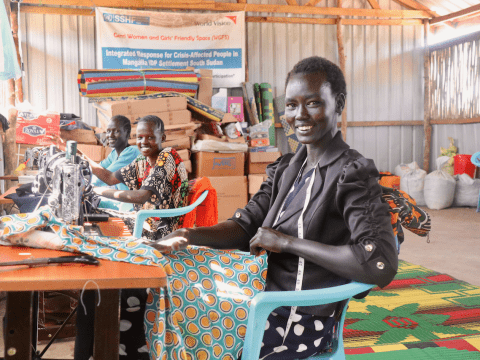Creating safe spaces for displaced women and girls

After years of hardship, 29-year-old Yar Mayom is starting to dream again.
A single mother of six, and guardian to two others, Yar is among the women and girls who were part of World Vision’s activities aimed at providing a safe place where women and girls are supported through processes of empowerment.
“My life, and that of my children, was so miserable when we first came to the camp,” Yar remembers. “I was traumatized and resorted to suicidal thoughts because of the stress I was going through having left my home for the first time.”
Yar arrived at the Mangalla Internally Displaced camp in 2020, fleeing flooding in her community of Jalle Village, a six to seven hour walk to Bor Town in Jongolei State.
Yar left her husband in Bor in hopes of finding a better and more secure place for her children and her orphaned nephew and niece, who she also takes care of.
“Before the floods, there was conflict in my village which claimed the life of my brother. Still, we never left because we had nowhere else to go,” Yar explains. “But the floods forced us out, it swept away everything I called my own, destroyed my farm, small business and nine of my cows, leaving behind only one which I had to sell in order to ride the boat to Juba.”
Mangalla is located near Juba, South Sudan’s capital city.
In partnership with the South Sudan Humanitarian Fund (SSHF), the women and girls’ friendly space reached out to communities across the camp with psychosocial support and counselling.
“For people that have undergone trauma, psychosocial support and counselling are necessary for recovery by giving them support to help them meet their mental, emotional, social, and spiritual needs,” highlights Enid K. Ocaya, World Vision South Sudan’s Humanitarian Emergencies and Cash Programs Manager.
Yar learned about the centre from a World Vision social worker and took part in counselling, “which relieved me of the trauma and stress that I suffered from moving,” she says.
In April 2022, World Vision offered the women and girls attending the Women and Girls’ Friendly Space life skills training in various areas such as tailoring, bedsheet knitting, baking, and milling.
Yar was one of 61 women and girls who took part in tailoring training. World Vision provided them with eight sewing machines to help the group generate income to support their families.
“With the support of this project and the women in my group, I am now able to change my life and support my family,” Yar says smiling.
She hopes income earned from tailoring will help all the children in her care attend school. Already school fees have been paid for four of the children.
“The centre has become a safe haven for most of us women. People now bring their clothes for sewing to the centre. I go to the centre every morning to be able to get some cash to buy food for my children. I am also able to sew clothes for my children, thus the entire dependence on the market has reduced,” Yar says.
World Vision’s Enid K. Ocaya adds, “Women by nature solve problems and gain life skills through interaction with fellow women. Safe spaces are instrumental in providing such an environment that promotes interaction. The skills learned from this centre help the women pursue other economic activities that are beneficial to them and their families. It is our hope that they can transfer these skills to their daughters and other women in their vicinity, in an attempt to leave no one behind.”